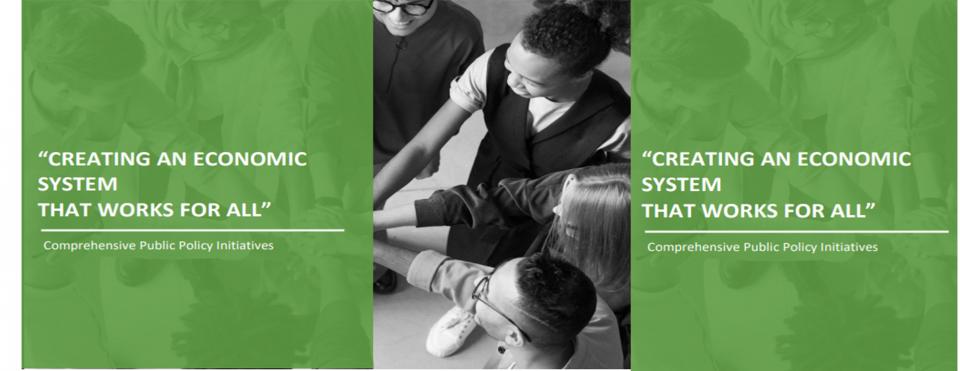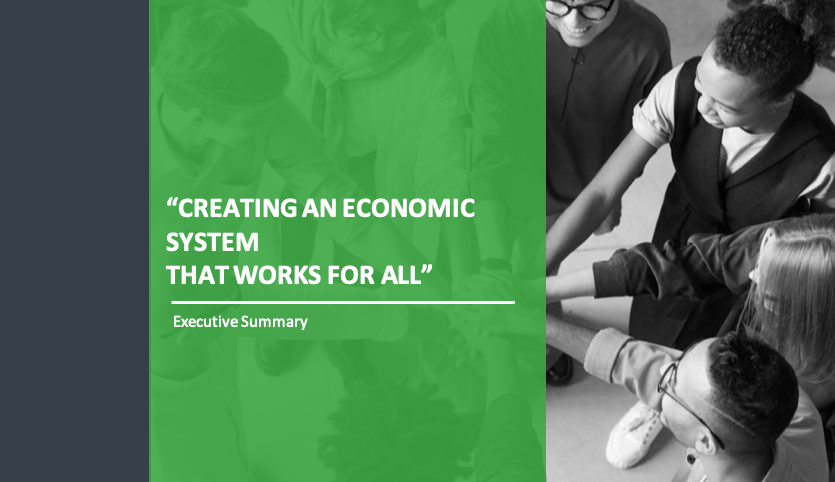Creating an Economic System that Works for All
There is no going back! The Covid-19 crisis has revealed what many of us have always known, our current system of capitalism does not work for most Americans. As Pulitzer Prize-winning journalist Steven Pearlstein recently wrote, “our economic system has run off the moral rails, offending our sense of fairness, eroding our sense of community, poisoning our politics and rewarding values that easily degenerate into greed and indifference.”
This working group will identify and develop the 10 most important business-related public policy initiatives required to Create an Economy that Works for All. These public policies will be presented to the Platform Committee of the Democratic and Republican Parties when they meet this summer.
While capitalism remains a dynamic force, challenges such as income inequality, market consolidation, climate change, and the financialization and underinvestment in America’s economy pose serious threats to our continued global leadership and social stability. Many across the country view our current capitalist system as rigged and not working for them.
Traditionally, businesses have focused on maximizing value for their owners and shareholders. But a growing chorus argues that this narrow focus has come at great cost to many others who also have a stake in the economy. If “capitalism is to work for all” then business leaders have to invent ways to simultaneously address the priorities of all their stakeholders.
These challenges have been called out over the last three to four decades with some but insufficient progress in the face of the global challenges we face. In August of 2019, CEO members of the Business Roundtable representing 181 of the largest global corporations, announced a modern standard for business by committing to lead their companies for the benefit of ALL stakeholders — customers, employees, suppliers, communities, and shareholders. This stated redirection in ‘business purpose’ now aligning with the values of companies already committed to advancing a just and sustainable economy may be an indication that the time has come for broader and more ambitious action. Unquestionably, this possibility will require many changes in the culture, practices, and measurement of business as well as the passage of public policies that are based on serving the needs of all stakeholders.
DOWNLOAD THE “CREATING AN ECONOMIC SYSTEM
THAT WORKS FOR ALL” REPORT
Solutions
Because the market is smart, but far from perfect, elected leaders working with business and other stakeholders must craft policies that address these challenges. ASBC is committed to influencing policymakers and regulators on environmental, workplace, social, and economic issues that foster broad-based prosperity. These include issues such as: promoting income equality to strengthen the middle class, addressing climate change, upgrading public infrastructure, promoting an equitable tax system, supporting a diverse and inclusive society, fostering innovation in sustainable products and packaging, encouraging new models of employee ownership and supporting clean water and safer chemicals.
What is required is a bold and integrated approach to complex, comprehensive systemic change, along with a new mindset and practical working relationships where organizations collaborate in a highly integrative and interdependent way to invent and address this transformation.
DOWNLOAD THE “CREATING AN ECONOMIC SYSTEM
THAT WORKS FOR ALL” EXECUTIVE SUMMARY
To become involved, please contact Ali-Reza Vahabzadeh, ASBN Vice President of Membership.




